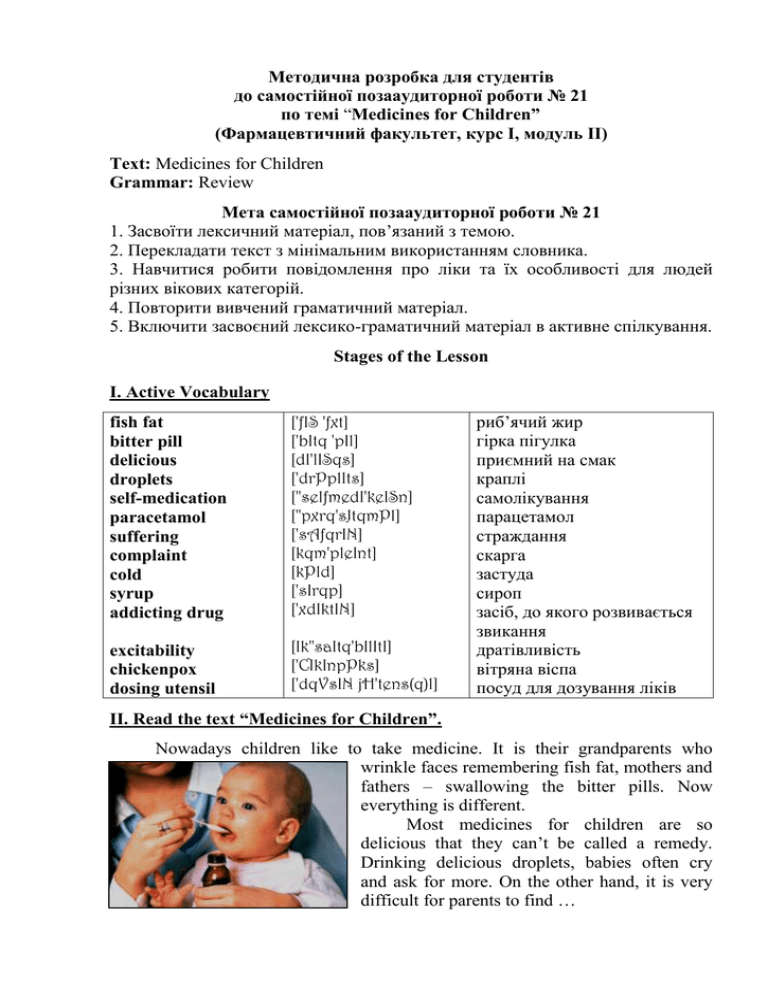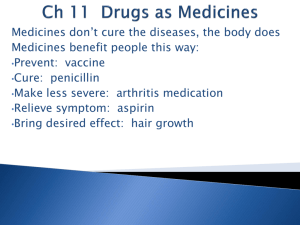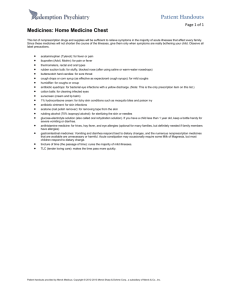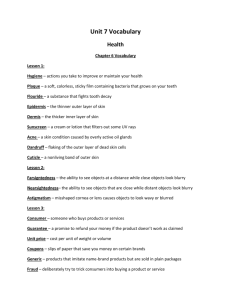“Medicines for Children”.
advertisement

Методична розробка для студентів до самостійної позааудиторної роботи № 21 по темі “Medicines for Children” (Фармацевтичний факультет, курс І, модуль ІІ) Text: Medicines for Children Grammar: Review Мета самостійної позааудиторної роботи № 21 1. Засвоїти лексичний матеріал, пов’язаний з темою. 2. Перекладати текст з мінімальним використанням словника. 3. Навчитися робити повідомлення про ліки та їх особливості для людей різних вікових категорій. 4. Повторити вивчений граматичний матеріал. 5. Включити засвоєний лексико-граматичний матеріал в активне спілкування. Stages of the Lesson І. Active Vocabulary fish fat bitter pill delicious droplets self-medication paracetamol suffering complaint cold syrup addicting drug ['fIS 'fxt] ['bItq 'pIl] [dI'lISqs] ['drPplIts] ["selfmedI'keISn] ["pxrq'sJtqmPl] ['sAfqrIN] [kqm'pleInt] [kPld] ['sIrqp] ['xdIktIN] excitability chickenpox dosing utensil [Ik"saItq'bIlItI] ['CIkInpPks] ['dqVsIN jH'tens(q)l] риб’ячий жир гірка пігулка приємний на смак краплі самолікування парацетамол страждання скарга застуда сироп засіб, до якого розвивається звикання дратівливість вітряна віспа посуд для дозування ліків II. Read the text “Medicines for Children”. Nowadays children like to take medicine. It is their grandparents who wrinkle faces remembering fish fat, mothers and fathers – swallowing the bitter pills. Now everything is different. Most medicines for children are so delicious that they can’t be called a remedy. Drinking delicious droplets, babies often cry and ask for more. On the other hand, it is very difficult for parents to find … Answer the following questions on the text. 1. Why do children like to take medicines nowadays? 2. Is it difficult for parents to find the right medicine in the wide range of different drugs? 3. The entire responsibility of self-medication lies on parents, doesn’t it? 4. In what cases do mothers give ‘Paracetamol Syrup’ to their children? 5. What are common complaints in children? 6. What drugs may children become addicted to? 7. Do children have the same adverse reactions to drugs as adults? 8. What is the difference between dosing medication for children and adults? 9. Must parents follow the instruction on the medication bottle? Why? 10.What utensils must be used in dosing drugs? 11.What can lead to an inadequately treated infection? III. Vocabulary and Speech Exercises I. Give English equivalents of the following words and word-combinations. Морщити обличчя; ковтати гірку пігулку; приємні на смак краплі; цілковита відповідальність; правильний діагноз; при найменшому симптомі застуди; не потрібно експериментувати; передозування; точна причина гарячки; сироп від кашлю; вага дитини; токсичні ліки; надмірна сонливість; антигістаміни; спирт; чайна ложечка; столова ложка; дозувальний шприц; щорічне терапевтичне періодичне видання. II. Discuss with your fellow-students some drugs that shouldn’t be given to children unless the doctor prescribes them. Aspirin can make your child susceptible to Reye’s syndrome, a rare but potentially fatal illness. It can also cause serious illness or even death in children with chickenpox or flu symptoms. Aspirin is sometimes referred to as ‘salicylate’ or ‘acetylsalicylic acid’. Anti-nausea medications have risks and possible complications. Don’t give your child anti-nausea medication unless the doctor specifically recommends it. Usually vomiting is short-lived, and children can handle it without medication. Oral decongestants like Dimetapp Elixir and Demazin Syrup aren’t recommended for children under two years of age. Adult medications or medication prescribed for someone else may harm your child. It’s never safe to give these to your child. Expired medicine doesn’t work and can even be harmful. Chewable tablets are too small to give to your child – he can easily choke on them. There’s no evidence that vitamin and mineral supplements help children’s health in any way unless the child has a deficiency of some kind – and very few children suffer from these deficiencies. III. Read and dramatize the following dialogue. Mother: Mr. Brown, my son often gets cold. The GP (General Practitioner) usually administers him cold and cough medicines. I know that a lot of them cause serious side effects. What’s the concern about cough and cold medicines for kids? Doctor: Over-the counter cough and cold medicines don’t effectively treat the underlying cause of a child’s cough. And won’t cure a child’s cough or make it go away any sooner. These medications also have potential side effects, including rapid heart rate and convulsions. FDA recommends that parents avoid using cough and cold remedies to treat children younger than age 2. Mother: My son is 4 years old. Are cough and cold medicines a problem for children older than age 2? Doctor: If you give cough and cold medicine to an older child, carefully follow the label direction. Don’t give your child two medicines with the same active ingredient, such as antihistamine, decongestant or pain reliever. Too much of a single ingredient could lead to accidental overdose. Mother: Many pediatricians insist on taking antibiotics in case of a child’s cold and cough. Is it feasible in such a case? I know that antibiotics are administered only in bacterial infections. Doctor: True enough! Antibiotics may be used to combat bacterial infections but have no effect on viruses, which cause cold. If your child has a cold, antibiotics won’t help. It’s also important to remember that the more your child uses antibiotics, the more likely he gets sick with an antibiotic resistant infection in the future. Mother: What medications available nowadays help treat the common cold? May I give my son aspirin in case of fever? Doctor: An over-the-counter pain reliever – such as acetaminophen or ibuprofen – can reduce the fever and ease the pain of a sore throat or headache. If you give your child a pain reliever, follow the dosing guidelines carefully. Don’t give ibuprofen to your son when he is dehydrated or vomiting continuously, and don't give aspirin until he is 15. Aspirin has been associated with Reye's syndrome, a rare but potentially fatal illness. IV. Render the following text in English. Часто, коли мова йде про ліки, батьки думають приблизно так: якщо препарат допомагає мені, то допоможе і дитині. Але діти – це не просто зменшена копія дорослих. Тому усі дитячі лікарські форми створені з врахуванням віку і маси тіла дитини. У виробництві ліків для дітей є свої особливості. До прикладу, у дитячих ліках, як правило, не використовують спирту. Є обмеження щодо використання у дитячих ліках барвників (colours), ароматизаторів (flavourings), консервантів (preservatives). Деякі лікарські препарати взагалі заборонені в дитячій практиці, деякі – мають чітке вікове обмеження. Наприклад, загальновідомий аспірин за рекомендацією ВООЗ дозволений до застосування дітям тільки з 15 років. Ліки для дітей здебільшого мають приємний фруктовий смак. У цьому є певна небезпека, бо ліки у свідомості дитини непомітно стають солодощами. Дитина, яка залишилася без нагляду дорослих, може випити цілий флакон смачного сиропу до останньої крапельки. Наслідки можуть бути трагічні. Тому будьякі ліки потрібно зберігати в місці, недоступному для дітей і давати дитині тільки під особистим контролем дорослих. Методичну розробку складено викладачем Цебрук І. Ф. Методичну розробку обговорено і затверджено на кафедрі мовознавстві. Протокол №____від_______ Зав. кафедри мовознавства, професор Голод Р.Б.




